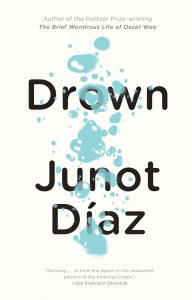Review: Junot Díaz Explores Contemporary Love in This Is How You Lose Her
Jonathan Smith//Blog Writer

Pulitzer Prize winning author Junot Díaz published This Is How You Lose Her, his second short story collection, in August of 2012. The compendium consists of nine interconnected short stories, with Yunior, a fan-favorite from Díaz’s previous works, earning the role of narrator in most of these stories. The collection includes work previously published in The New Yorker, Story, and Glimmer Train. It received overwhelmingly positive response from readers and critics alike, placing it in the top ten books of 2012 for many publications, including Time. If these accolades aren’t reason enough to read this collection, rest assured that it has my stamp of approval as well.
Díaz, who currently works as a creative writing professor at the Massachusetts Institute of Technology, typically writes characters with verve and an element of anger. Yunior, the protagonist for much of this collection, narrates his experiences in much the same way. A major component of what makes an excellent short story is how well the author crafts the opening paragraph as it truly sets the tone for the rest of the piece. It forces the reader to question what is to come, why we should care, and how it should be resolved. Perhaps my favorite short story in the collection, “The Sun, the Moon, the Stars,” offers such a paragraph. “I’m not a bad guy,” it begins. “I know how that sounds—defensive, unscrupulous—but it’s true. I’m like everybody else: weak, full of mistakes, but basically good” (3). Upon reading this, one must question why the narrator has to tell us he is not a bad person and to whom he is pleading the case.
A point of contention in the writing community is whether one should remove quotations from dialogue. For some readers it can be truly confusing as to which character is speaking or whether the narrator is speaking, especially when there are multiple exchanges of dialogue within the same paragraph. For Díaz, however, most of his work lives by the concept that quotations are optional. In fact, there is not a single quotation mark used in this collection for dialogue. It is a true testament of the strength of Díaz’s writing style when I say that I had virtually no difficulty understanding who was speaking or narrating on my initial read. And I find myself yearning to write a story in this same manner.

There is a decent variety of stories here, with most focusing on Yunior’s romantic relationships, his brother Rafa’s relationships and cancer diagnosis, and life in low-income communities. This collection is able to work well in a non-linear order because of the nuances of the characters. For example, the first story, “The Sun, the Moon, the Stars,” presents Yunior in his twenties or thirties trying to win back Magda’s heart after cheating on her. But the next story, “Nilda,” presents Yunior as a young teenager who is interested in comic books and Nilda, who was Rafa’s girlfriend at the time. The reader is able to identify, in some sense, with the complexity of Yunior’s relationships and come to understand his sometimes-immoral decisions as more background unravels throughout the stories.
It must be said that there is a fair amount of adult content in this collection. There are many sexist assertions cast throughout the collection as well, especially toward the female characters and the way they are physically described. But that is not to say there are no strong female characters. In fact, one of my favorite characters is Yunior and Rafa’s mother, who raises her two sons as a single parent.
This Is How You Lose Her will leave the reader wanting more, as every good compendium should. This is an excellent collection of Díaz’s work, and is accessible even for those like me who have not yet read his first short story collection, Drown, or the Pulitzer Prize winning The Brief Wondrous Life of Oscar Wao.
Rating: 9/10
